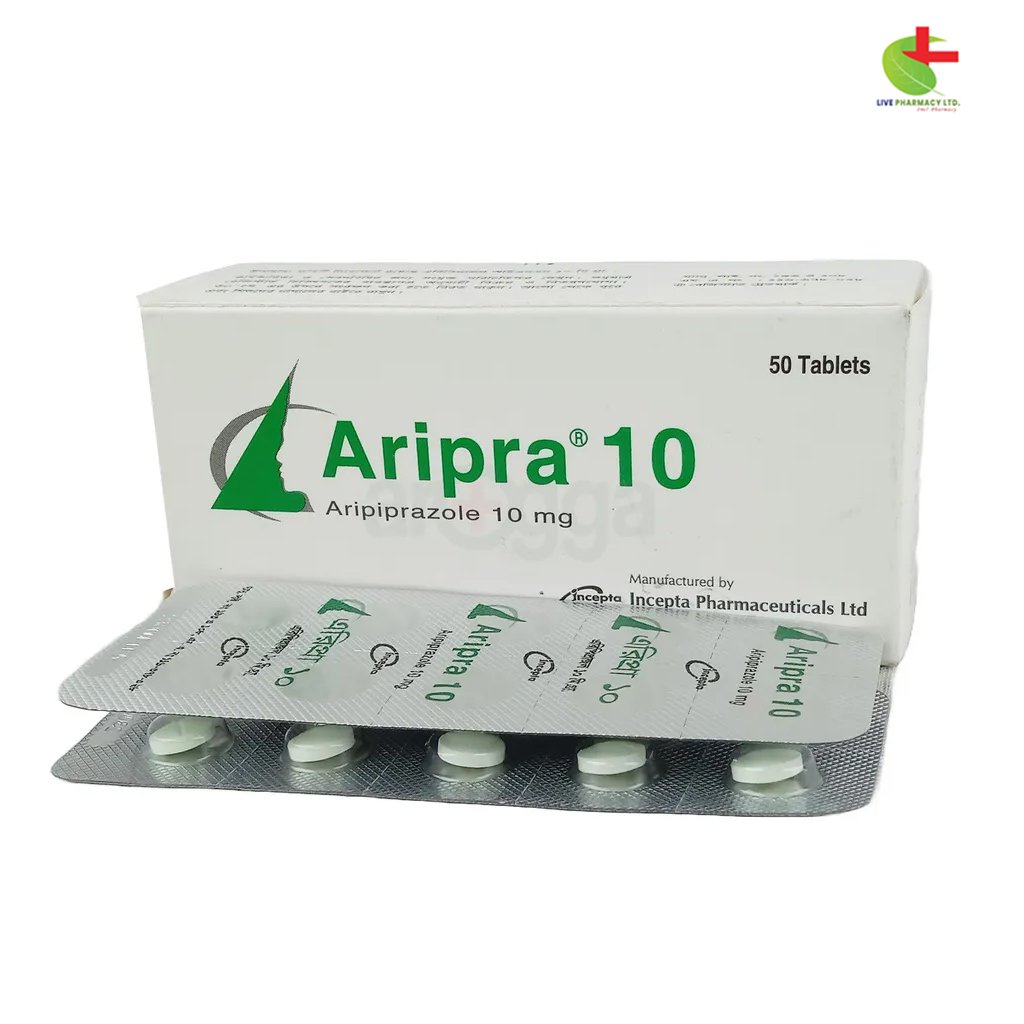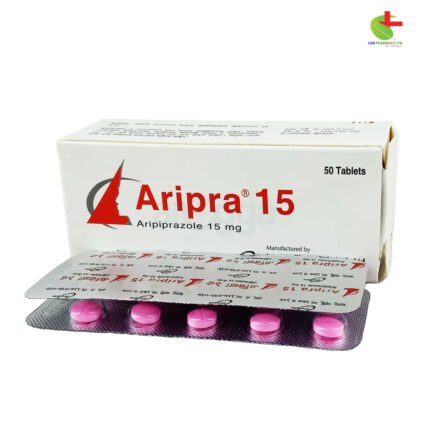Aripra 10
50.00৳ Strip
- Aripra is an atypical antipsychotic medication used to treat schizophrenia, bipolar disorder, and major depressive disorder.
- It modulates dopamine and serotonin receptors to alleviate symptoms like irritability in autism and agitation in bipolar mania.
- Always consult a healthcare professional before use.
- Follow prescribed dosages for optimal safety and effectiveness.
 Brand
Brand
|
Incepta Pharmaceuticals Ltd |
|---|---|
 Generics
Generics
|
Aripiprazole |
 Type
Type
|
Tablet |
Indications
Aripra is prescribed for the following conditions:
- Schizophrenia
- Bipolar Disorder
- Adjunctive Treatment for Major Depressive Disorder
- Irritability Linked to Autistic Disorder
- Agitation Related to Schizophrenia or Bipolar Mania
Always consult a registered healthcare professional before taking this medication.
Pharmacology
Aripiprazole is classified as an atypical antipsychotic. Its therapeutic effects are believed to stem from a combination of partial agonist activity at dopamine D2 and serotonin 5-HT 1A receptors, alongside antagonist activity at serotonin 5-HT 2A receptors. This mechanism supports the management of schizophrenia, bipolar disorder, major depressive disorder, irritability associated with autism, and agitation in schizophrenia or bipolar conditions.
Dosage Guidelines
For Schizophrenia: Adults
- Initial Dose: 10-15 mg/day
- Recommended Dose: 10-15 mg/day
- Maximum Dose: 30 mg/day
For Schizophrenia: Adolescents (Ages 13-17)
- Initial Dose: 2 mg/day
- Recommended Dose: 10 mg/day
- Maximum Dose: 30 mg/day
For Bipolar Mania: Adults (Monotherapy)
- Initial Dose: 15 mg/day
- Recommended Dose: 15 mg/day
- Maximum Dose: 30 mg/day
For Bipolar Mania: Adults (Adjunct to Lithium or Valproate)
- Initial Dose: 10-15 mg/day
- Recommended Dose: 15 mg/day
- Maximum Dose: 30 mg/day
For Bipolar Mania: Pediatric Patients (Ages 10-17)
- Initial Dose: 2 mg/day
- Recommended Dose: 10 mg/day
- Maximum Dose: 30 mg/day
As an Adjunct to Antidepressants for Major Depressive Disorder: Adults
- Initial Dose: 2-5 mg/day
- Recommended Dose: 5-10 mg/day
- Maximum Dose: 15 mg/day
For Irritability Associated with Autistic Disorder: Pediatric Patients (Ages 6-17)
- Initial Dose: 2 mg/day
- Recommended Dose: 5-10 mg/day
- Maximum Dose: 15 mg/day
Consult a registered healthcare professional before medication use.
Administration
- Oral Formulations: Take once daily, irrespective of meals.
- IM Injection: Allow a minimum of 2 hours between doses; maximum daily dose is 30 mg. Consult a registered healthcare professional before medication use.
Drug Interactions
Caution is advised when combining Aripra with other central nervous system agents and alcohol. Carbamazepine may enhance Aripra clearance, reducing its efficacy, while medications such as ketoconazole, quinidine, fluoxetine, or paroxetine can increase Aripra levels in the blood.
Contraindications
- Known hypersensitivity to Aripiprazole.
Potential Side Effects
Common side effects include nausea, vomiting, akathisia, extrapyramidal symptoms, drowsiness, dizziness, insomnia, tremors, restlessness, fatigue, blurred vision, increased salivation, constipation, fever, drooling, and decreased appetite.
Pregnancy & Lactation
- Pregnancy Category C: Use during pregnancy is not recommended. Nursing mothers should avoid breastfeeding while taking Aripiprazole.
Precautions & Warnings
- Elderly Patients with Dementia-Related Psychosis: Increased risk of cerebrovascular events (e.g., stroke).
- Suicidality Risk: Higher risk of suicidal thoughts in children, adolescents, and young adults with major depressive disorder.
- Tardive Dyskinesia: Discontinue use if clinically indicated.
- Metabolic Changes: Atypical antipsychotics can lead to weight gain, dyslipidemia, and hyperglycemia.
- Orthostatic Hypotension: Use with caution in individuals with cardiovascular issues.
- Seizure History: Caution advised for those with a seizure history.
- Operating Machinery: Exercise caution when performing tasks requiring alertness.
Overdose Effects
Doses up to 1080 mg of Aripra have not resulted in fatalities. Symptoms of overdose may include nausea, vomiting, weakness, diarrhea, and drowsiness.
Therapeutic Class
- Atypical Neuroleptic Drugs
Storage Instructions
Store below 30°C, away from light and moisture. Keep out of reach of children.













Reviews
There are no reviews yet.